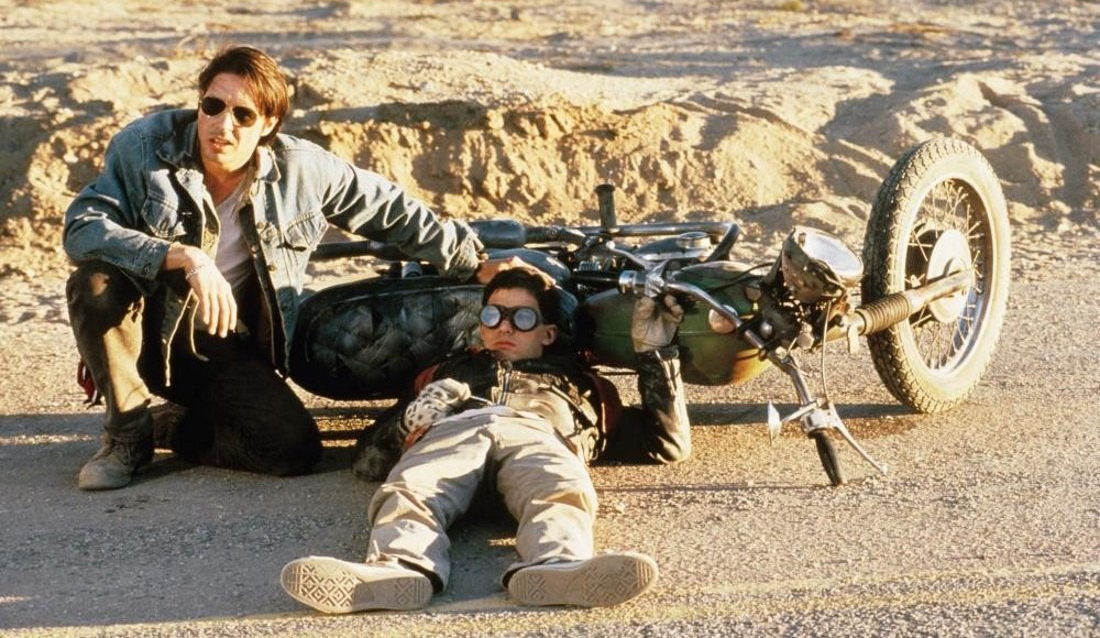“It’s a good movie, for what it is,” John Doe says. “It’s not a great movie.” Doe, of LA punk originators X, is talking about Roadside Prophets, the 1992 film he starred in alongside Ad-Rock, who was billed under his real name, Adam Horovitz. If this doesn’t ring any bells, it’s not your fault. For starters, it’s out of print. And even when it was theoretically available, it wasn’t easy to see. The film came out via Fine Line, New Line’s now-defunct specialty films division, and Doe says the relationship between the two studios was somewhat acrimonious. Both wanted to represent the movie, but when they found that out, neither wanted to. It was in theaters briefly, and then it vanished almost completely.
The plot is straightforward enough. Doe’s character, Joe, is a factory worker in Los Angeles who bonds over motorcycles with a new coworker named Dave. Dave electrocutes himself playing video games (it’s probably happened before) and is dead six and a half minutes into the movie. Joe, now entrusted with his ashes, gets on his motorcycle to drive his deceased buddy to El Dorado, a mythical place Dave had mentioned and which Joe plans to find with a combination of instinct and gas-station road maps. It turns out he’s being followed by Sam (Horovitz), a restless, high-strung young guy who asks if he and his bike can ride along. Joe says yes. Well, Joe actually says that it’s a free road, but nevertheless: off we go.
The film was written and directed by Abbe Wool, who co-wrote Sid and Nancy, and it seems like the part of Joe was written with Doe in mind; the motorcycle and the lone-wolf vibe all feel right at home on him. Likewise, Sam, who’s young and full of energy, with firecrackers in his bookbag at all times, is the visual equivalent of Ad-Rock’s vocals on Beastie Boys records. So what’s the story? How did Doe and Horovitz come to be in this film that seems perfectly tailored to their personas?
“Um… I auditioned,” says Doe, “and they liked me.” No shock there. In addition to being a musical legend, Doe is a working actor. His filmography is composed of indie movies (Border Radio), major motion pictures (Boogie Nights), and TV shows (Carnivàle). As far as Horovitz, Doe says he’s not sure how he made his way to the film, but he was a replacement. “I actually think his part was supposed to be played by Max Perlich, and Max couldn’t do it.
“At the time, I wished it would’ve been more widespread. [But] at this point, it’s much better to be mysterious and unavailable.”
“I didn’t know Adam from Adam,” he continues, laughing. “But we got really close really quickly.” During shooting, Doe was in his late thirties, while Horovitz was in his mid-twenties. “Since I was older and my character was kind of the leader, I played that role. Abbe would have these elaborate instructions, and Adam would be looking at her like he’s paying attention. She would walk away and he’d go, ‘I’ll follow [what you do].’ And it’s like, you asshole, you’re a part of this thing! But I found that pretty endearing.”
Not surprisingly, the movie ended up being notable mostly for its eclectic cast. The first person Joe bumps into after leaving his motel is a bartender played by Arlo Guthrie. (“He just made up shit, and they got it on the first or second take,” Doe says.) Timothy Leary plays a truck driver who stops for Joe and Sam on the road. David Carradine is a sort of shaman they meet in the woods. John Cusack is a voracious dine-and-dasher with an eyepatch.
Despite the weird wattage, Doe’s earlier assessment of the film is spot on. It’s no better or worse than much of what made it out of major studios in the ’90s that has since been elevated to cult status—Empire Records, Mallrats, and so on—and it has its adoring fans in comment sections all over the Internet. But Roadside Prophets almost transcends cult status. Its rarity has made it the stuff of legend, albeit a legend not frequently told. Doe is happy—impressed, even—to hear that a DVD of Roadside Prophets is listed at $49.99 on eBay.
“At the time, I wished it would’ve been more widespread,” he concedes, “[but] at this point, it’s much better to be mysterious and unavailable.” He ranks this as easily one of his favorite movies that he’s worked on, and he recalls his time with Horovitz especially fondly. “The sort of funny and sad thing is that, [as happens with] a lot of productions, we hung out a lot and then didn’t see each other. I always felt like, ‘Gee, I wonder whatever happened to him?’ Oh, that’s right, he’s a big fucking rock star. That’s what happened to him.” FL
This article appears in FLOOD 6. You can download or purchase the magazine here.







